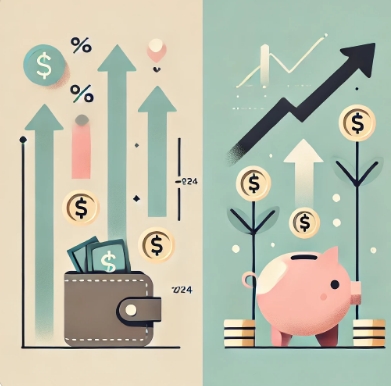if you’ve noticed your grocery bills getting higher, and your savings not growing like it used to, or the cost of pretty much everything going up, you’re feeling the impact of inflation. In 2024, inflation is on everyone’s mind. It’s affecting how we spend, save, and invest our money. But what exactly does inflation mean for your personal finances, and more importantly, what can you do about it?
Inflation doesn’t have to ruin your financial plans. By understanding how it works and making a few adjustments, you can protect your wallet and even come out ahead. Let’s dive into how inflation affects different aspects of personal finance and explore some practical ways to handle it.
Rising Prices: How Inflation Hits Your Day-to-Day Spending
Inflation is most noticeable when you’re going about your daily life—buying groceries, filling up your gas tank, or paying bills. Everything seems to cost more than it did just a few months ago. That’s because in 2024, inflation is running at around 5-6%, meaning prices are rising faster than wages in many cases.
For example, grocery prices have jumped by about 10% this year, with essentials like milk, bread, and meat seeing some of the biggest hikes. According to Statista, the average cost of milk has gone from $3.50 in 2022 to almost $4.00 now. Gas prices, too, are higher, which adds up quickly, especially for those who commute.
Especially, the more prices rise, the less your paycheck can cover. This means you’ll have less money left over for extras like eating out, entertainment, or saving for future goals. Inflation squeezes your budget, and it can feel like your hard-earned money just doesn’t go as far as it used to.
Your Savings: Why Inflation Eats Away at Your Nest Egg
One of the sneaky ways inflation affects your finances is through your savings. Let’s say you’ve been putting money into a savings account earning 1-2% interest. That might have felt like a good move in the past, but if inflation is at 6%, your money is actually losing value over time.
Here’s how it works: even if you don’t touch your savings, the purchasing power of that money shrinks as prices rise. In real terms, the $10,000 you have in the bank today won’t buy as much a year from now if inflation outpaces the interest you’re earning. So while your savings account might look fine on paper, its actual value in terms of what you can buy is going down.
Investments: Some Win, Some Lose in Inflationary Times
Inflation doesn’t just impact savings; it also has a big effect on investments. The good news is that some types of investments actually do better when inflation is high. Stocks, real estate, and certain commodities (like gold and oil) tend to rise in value along with inflation, while bonds often struggle.
In 2024, stocks in sectors like energy and consumer staples—companies that make everyday essentials—have been strong performers. That’s because even when prices go up, people still need to buy gas, food, and other basics. Meanwhile, bonds, which pay a fixed return, lose value because the interest they offer doesn’t keep pace with rising prices.
Real estate is another great hedge against inflation. Property values tend to increase when inflation does, which is why home prices have gone up 4.9 percent from May 2023 to May 2024., according to a report from the Bankrate . So, while cash savings might lose value, investments in real estate can help you preserve and grow your wealth.
Debt: How Inflation Affects What You Owe
Inflation can actually be a double-edged sword when it comes to debt. If you have a fixed-rate mortgage or loan, inflation can work in your favor. Your payments stay the same, but the real value of that debt decreases over time, meaning you’re paying it off with money that’s worth less.
On the otherhand, , if you have variable-rate debt—like credit cards or an adjustable-rate mortgage—higher inflation means higher interest rates. And in 2024, interest rates have risen sharply, making borrowing more expensive. Credit card interest rates have jumped to an average of 22.75%, which can lead to serious financial strain if you carry a balance month to month.
How to Protect Your Finances from Inflation
The good news is, that you don’t have to just sit back and watch inflation erode your savings and budget. There are practical steps you can take to protect your money. Here’s what you can do:
Diversify Your Investments
One of the best ways to shield your money from inflation is by spreading it across different types of investments. Stocks, real estate, and commodities like gold tend to perform well when inflation is high. For instance, in 2024, gold prices have risen by 15%, which makes it a solid choice for anyone looking to hedge against inflation.
By diversifying your portfolio, you can balance out the risk and ensure that you’re not too dependent on any single type of asset. This way, when one part of the market struggles, another can help you stay afloat.
Look Into Inflation-Protected Bonds
If you want something safer than stocks or real estate, consider Treasury Inflation-Protected Securities (TIPS). These government bonds are designed to protect your investment from inflation. As inflation goes up, the value of TIPS adjusts, ensuring that your money keeps pace with rising prices. It’s a lower-risk way to maintain your purchasing power.
Reevaluate Your Budget
Inflation means that the cost of essentials like food, rent, and utilities is going up. To stay on top of your finances, you’ll need to revisit your budget and make adjustments. Start by tracking your expenses and cutting back where possible—whether that’s eating out less, canceling unnecessary subscriptions, or finding cheaper alternatives for household goods.
A simple budgeting strategy is the 50/30/20 rule: allocate 50% of your income to essentials, 30% to discretionary spending, and 20% to savings and debt repayment. If inflation is eating into your essentials, consider cutting back on discretionary spending to keep your financial plan on track.
Pay Off High-Interest Debt
If you have credit card debt or other variable-rate loans, it’s time to make paying them off a priority. With interest rates on the rise, carrying a balance will only get more expensive. By focusing on eliminating high-interest debt, you’ll free up more of your budget and avoid getting stuck with even higher payments in the future.
Adjusting Your Investments for Inflation
As inflation rises, your investment strategy should evolve. Here’s how to make sure your money continues to grow even when prices are going up:
Rebalance Your Portfolio
Inflation can shake up the financial markets, so it’s important to periodically review your investment portfolio. Consider shifting more of your money into inflation-resistant assets like stocks in the energy, healthcare, and consumer staples sectors. These companies tend to hold their value better when prices rise.
Focus on Dividend-Paying Stocks
Dividend-paying stocks offer two benefits during inflationary times: they provide regular income through dividend payouts, and many companies increase their dividends over time to keep pace with inflation. For example, utility companies have been a safe bet in 2024, with dividend yields averaging 5.6% according to Morningstar.
Common Mistakes to Avoid During Inflation
When inflation hits, it’s easy to make financial decisions that hurt rather than help. Here are some common mistakes to watch out for:
Not Adjusting Your Spending
Many people continue to spend the same way they did before inflation hit, without adjusting for higher costs. This can lead to overspending and even debt. Make sure you’re paying attention to where your money is going and cutting back where possible.
Ignoring Your Investment Portfolio
It’s tempting to just leave your investments alone, but inflation requires a closer look at your portfolio. Holding too much cash or bonds can lead to lost value over time. Make sure your investments are diversified and include assets that can keep up with inflation.
Carrying High-Interest Debt
Letting credit card balances carry over month to month is costly in the best of times, but with rising interest rates, it’s even more expensive. Make a plan to pay down your high-interest debt as quickly as possible to avoid getting trapped in a cycle of increasing payments.
In summary, Inflation is challenging, but it doesn’t have to derail your financial goals. By staying proactive, reviewing your budget, and adjusting your investments, you can protect your money from inflation’s impact. The key is flexibility—being willing to make changes when needed, whether that’s cutting back on spending, diversifying your portfolio, or paying down debt.
With these strategies, you can not only survive inflation but come out of it with a stronger financial footing. In 2024 and beyond, understanding how to manage inflation is essential for anyone looking to maintain financial stability and growth.






